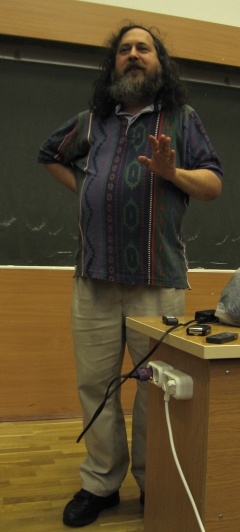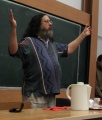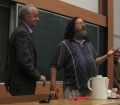Richard Stallman, Free software: ethics and practice
Материал из eSyr's wiki.
м |
(→Расшифровка лекций) |
||
| Строка 22: | Строка 22: | ||
<p><b>Freedom 2</b>: the freedom to help your neighbors, the freedom to distribute exact copies, make and distribute exact copies when you wish. </p> | <p><b>Freedom 2</b>: the freedom to help your neighbors, the freedom to distribute exact copies, make and distribute exact copies when you wish. </p> | ||
<p>And <b>freedom 3</b>: the freedom to contribute to your community, the freedom to make and distribute copies of your modified versions when you wish. ... </p> | <p>And <b>freedom 3</b>: the freedom to contribute to your community, the freedom to make and distribute copies of your modified versions when you wish. ... </p> | ||
| - | <p> | + | <p>If the program gives you all four of these freedoms, it is free software, freedom-respecting software, «свободный» software. </p> |
| - | <p>So, once the GNU ... | + | <p>So, once the GNU plus Linux(?) system was... existed in the nineties, and people started to use it, I've started getting invited to give more speeches, and in the end of the speech sometimes people would ask whether the same ideas of the free software movement that all software should be free and all users should have its freedoms ... applied(?) to anything but software. </p> |
<p>Sometimes they were saying "what about hardware, should computers be free, or microphones, or tables or chairs?". Well, that is silly question. Because it doesn't even make sense entirely. What would it mean for this table to be free in the same sense? </p> | <p>Sometimes they were saying "what about hardware, should computers be free, or microphones, or tables or chairs?". Well, that is silly question. Because it doesn't even make sense entirely. What would it mean for this table to be free in the same sense? </p> | ||
| - | <p>Well, it would mean, you have freedom 0, the freedom to use the table as you wish. Well, if you buy table, you | + | <p>Well, it would mean, you have freedom 0, the freedom to use the table as you wish. Well, if you buy table, you pretty much can use it as you wish, so you have freedom 0. |
| - | What about freedom 1, the freedom to study the source code of the table and to change it to make the table do what you wish? Well, there is no source code, so this is freedom that doesn't entirely make sense. But you can study the table and you can modify the table. This table is made of wood. I could cut an edge of every leg if I want to and I have a lower table | + | What about freedom 1, the freedom to study the source code of the table and to change it to make the table do what you wish? Well, there is no source code, so this is freedom that doesn't entirely make sense. But you can study the table and you can modify the table. This table is made of wood. I could cut an edge of every leg if I want to and I have a lower table. You know, there're various modifications you can do. So, and the fact is for the most part nobody will stop you if it's your table, you can modify it. So you have freedom 0 and you have freedom 1 partly to the extent it makes sence. But are you in the computer, you basically cannot modify very much – it's impossible. Nobody can modify curcuitry in a chip – you'll just destroy it. [Can we open the window? It's getting hot in here]. </p> |
| - | <p>What about freedom 2, the freedom to copy, distribute the copies, | + | <p>What about freedom 2, the freedom to copy, distribute the copies, for there are no copiers for tables? So that's completely meanless. </p> |
| - | <p>And what about freedom 3, the freedom to copy and distribute copies of your modified versions of the table? Well, if you change this table by cutting edge of each leg, well there's still no copiers, so you wouldn't be able to put modified table into a copier and distribute copies to people. So, basically, these physical objects in most cases | + | <p>And what about freedom 3, the freedom to copy and distribute copies of your modified versions of the table? Well, if you change this table by cutting an edge of each leg, well there's still no copiers, so you wouldn't be able to put modified table into a copier and distribute copies to people. So, basically, these physical objects in most cases all are as free as they could possibly be, but ... that's a very partial extend. So that was a silly question. (They?) didn't really understand. The people with that question didn't really understand what 'free' means They didn't think carefully. </p> |
| - | <p>But there | + | <p>But there are other things about which this question makes sense. And ... (no clam-up for?) the works of the workmanship that you might have a copy of. Because there're always those who can copy it, and those who can modify it. And so the question of wheteher you are permitted to do is a real and important question. That is a question that this speech is about. If you have a copy of something, some work, which is not software, then to the most part the only thing that could restrict your freedom to copy or distribute or modify, is copyright law. So the same question looked(?) at from the other side is: what should copyright law say about those works?</p> |
Версия 15:49, 22 марта 2008
Диктофонные записи
Фотографии
Расшифровка лекций
So, ... in my previous speech as I elsewhere, I spoke about the free software movement, about software that respects the user's freedom, and I explained why software users deserve four essential freedoms.
Freedom 0: the freedom to run a program as you wish.
Freedom 1: the freedom to study the source code, to change it so that program does what you wish.
Freedom 2: the freedom to help your neighbors, the freedom to distribute exact copies, make and distribute exact copies when you wish.
And freedom 3: the freedom to contribute to your community, the freedom to make and distribute copies of your modified versions when you wish. ...
If the program gives you all four of these freedoms, it is free software, freedom-respecting software, «свободный» software.
So, once the GNU plus Linux(?) system was... existed in the nineties, and people started to use it, I've started getting invited to give more speeches, and in the end of the speech sometimes people would ask whether the same ideas of the free software movement that all software should be free and all users should have its freedoms ... applied(?) to anything but software.
Sometimes they were saying "what about hardware, should computers be free, or microphones, or tables or chairs?". Well, that is silly question. Because it doesn't even make sense entirely. What would it mean for this table to be free in the same sense?
Well, it would mean, you have freedom 0, the freedom to use the table as you wish. Well, if you buy table, you pretty much can use it as you wish, so you have freedom 0. What about freedom 1, the freedom to study the source code of the table and to change it to make the table do what you wish? Well, there is no source code, so this is freedom that doesn't entirely make sense. But you can study the table and you can modify the table. This table is made of wood. I could cut an edge of every leg if I want to and I have a lower table. You know, there're various modifications you can do. So, and the fact is for the most part nobody will stop you if it's your table, you can modify it. So you have freedom 0 and you have freedom 1 partly to the extent it makes sence. But are you in the computer, you basically cannot modify very much – it's impossible. Nobody can modify curcuitry in a chip – you'll just destroy it. [Can we open the window? It's getting hot in here].
What about freedom 2, the freedom to copy, distribute the copies, for there are no copiers for tables? So that's completely meanless.
And what about freedom 3, the freedom to copy and distribute copies of your modified versions of the table? Well, if you change this table by cutting an edge of each leg, well there's still no copiers, so you wouldn't be able to put modified table into a copier and distribute copies to people. So, basically, these physical objects in most cases all are as free as they could possibly be, but ... that's a very partial extend. So that was a silly question. (They?) didn't really understand. The people with that question didn't really understand what 'free' means They didn't think carefully.
But there are other things about which this question makes sense. And ... (no clam-up for?) the works of the workmanship that you might have a copy of. Because there're always those who can copy it, and those who can modify it. And so the question of wheteher you are permitted to do is a real and important question. That is a question that this speech is about. If you have a copy of something, some work, which is not software, then to the most part the only thing that could restrict your freedom to copy or distribute or modify, is copyright law. So the same question looked(?) at from the other side is: what should copyright law say about those works?








